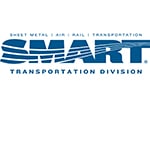
The SMART-Transportation Division has reached out to the chairman of the National Carriers’ Conference Committee (NCCC) seeking answers as to what the rail industry’s response would be to the spread of the COVID-19 respiratory illness, especially when considering the strict attendance policies of carriers.
This is the first of what will be a number of outreach efforts by the union to transportation stakeholders to protect the health and jobs of SMART-TD members as the illness, commonly known as the coronavirus, spreads.
At present, the Centers of Disease Control and Prevention (CDC) and other reputable sources report 158 patients being treated in 17 states for the disease, which starts out with respiratory symptoms such as coughing, sneezing, shortness of breath and/or fever. In order to prevent the virus’s spread, CDC has recommended that affected workers remain at home.
“As we have discussed on numerous occasions, this philosophy is incongruent with many of the rail carriers’ current attendance policies, which can be described as unforgiving, at best, for employees who miss work due to illness,” SMART-TD President Jeremy Ferguson wrote to the NCCC’s Brendan Branon.
Ferguson said that the communications efforts of the NRC/UTU Health and Welfare Plan Governing Committee in conjunction with the Railroad Employees’ National Health and Welfare Plan to inform, educate and help protect members from coronavirus could have a positive impact in stopping the spread of the virus among transportation workers.
However, he asked Branon to map out a more detailed response in cooperation with the governing committee to answer questions about the industry’s response to the virus going forward:
Do the carriers plan to adopt the CDC’s guidelines, specifically, the CDC’s Interim Guidance for Businesses and Employers to Plan and Respond to Coronavirus Disease 2019 (COVID-19), as published on the CDC.gov website?
If the answer is yes, do the carriers plan to relax their current attendance policies for employees who miss work accordingly?
If the answer is no, then what are the carriers’ alternative plans or suggestions?
Do the carriers plan to relax their current attendance policies for employees who miss work as a result of a family member, or someone who resides in the same household, contracting coronavirus or showing such symptoms?
Do the carriers plan to relax their current attendance policies for employees who miss work because they determine that they should be tested for coronavirus?
What steps are the carriers taking, if any, to sanitize the workplace (including but not limited to equipment, company provided transportation and away-from-home lodging facilities, and other common areas such as offices and crew staging areas)?
COVID-19 is easily spread through respiratory droplets produced when an infected person coughs or sneezes, the CDC said. It also may be possible that a person can get COVID-19 by touching a surface or object that has the virus on it and then touching their own mouth, nose, or possibly their eyes, but this is not thought to be the main way the virus spreads, CDC said.
Additional outreach is planned by SMART-TD to the federal Department of Transportation, federal Health and Human Services Department, Federal Railroad Administration and the Association of American Railroads.
Related News
- Registration Open for St. Paul Regional Training Seminar
- Important DOT Drug Testing Notice Affects Members
- Honoring the Life of Brother Ed Weathers, Jr.
- Members Helped Raise $200K for Brothers and Sisters in Need
- Resolve to Keep Your Timebook Current in 2026
- Victory in Chicago as SMART-TD Helps Establish New $1.5 Billion Transit Agency
- New Jersey Train Length, Crew Size Law Awaits Governor’s Signature
- CSX Conductor, Single Mother Devastated in Head-on Collision
- SOFA Safety Alert
- AJFL Scholarship Application Opens Soon